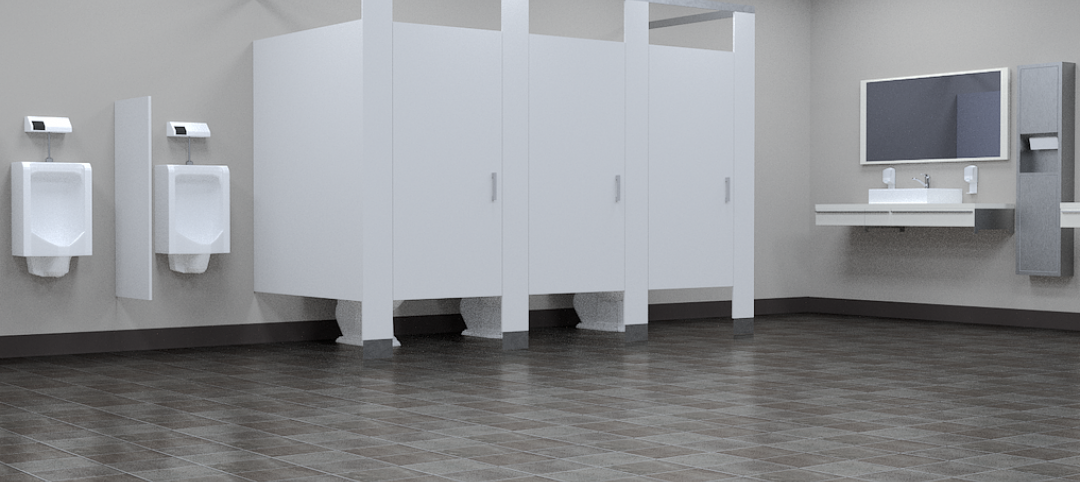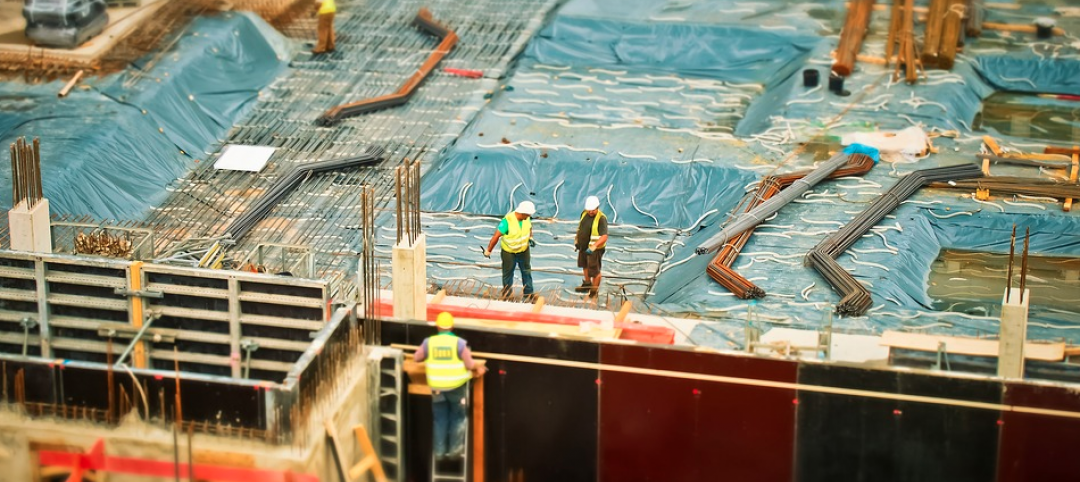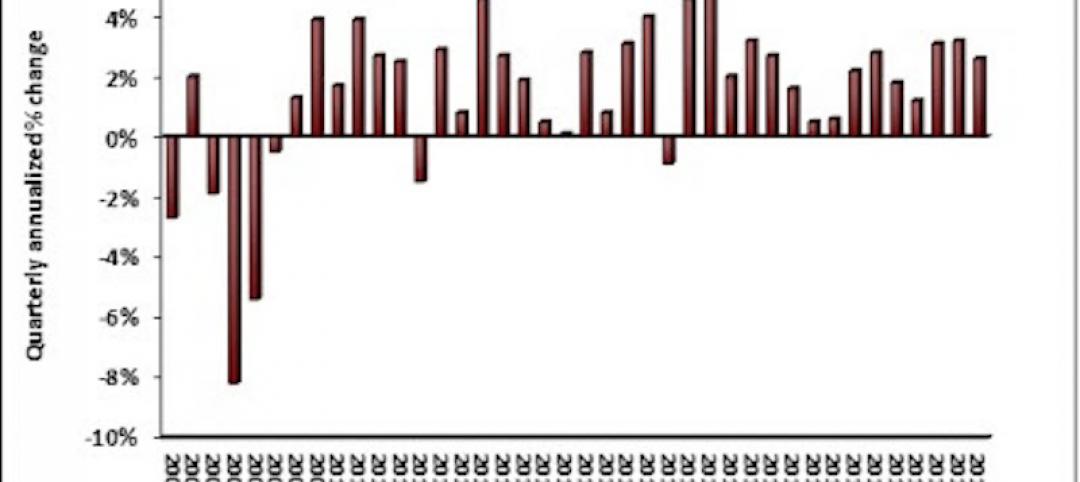Commercial construction is in high demand across the country and contractors are confident in the trajectory of the industry, according to the USG + U.S. Chamber of Commerce Commercial Construction Index (‘Index’), that launched recently. Nearly all contractors surveyed – 96 percent – expect revenues to grow or remain stable this year compared to 2016, with 40 percent expecting an increase and only 3 percent expecting a decrease in revenue.
The Index is a new quarterly economic indicator designed to gauge what drives the commercial construction industry and its leaders, including specific issues like backlog of work, new business pipeline, revenue projections, workforce issues, and access to financing. Given the sector’s importance to the U.S. economy and the outsized role it could play in years to come, the data contained in the Index will be vital to better understanding trends, challenges and opportunities. The research was developed with Dodge Data & Analytics (DD&A), the leading provider of insights and data for the construction industry, by surveying commercial and institutional contractors.
“This first-of-its-kind Index was born out of a need to understand the issues that affect commercial construction. The Index will deliver critical insights into the future health of the industry,” said Jennifer Scanlon, president and chief executive officer of USG Corporation. “USG is committed to providing solutions for our customers in order to help the entire industry make strong contributions to the U.S. economy. Through the Index we are able to identify areas of strength and pinpoint areas of improvement where industry leaders must focus.”
Two-thirds (66 percent) of contractors said they expect to employ more workers in the next six months, indicating growth in a sector that employs approximately 3 million Americans. But 61 percent of Index respondents reported difficultly finding skilled workers. The contractors reported the biggest shortages in the concrete, interior finishes/millwork, masonry, electrical and plumbing trades.
“The commercial construction industry is a vital engine for the American economy,” said Tom Donohue, president and CEO of the U.S. Chamber. “The projected growth uncovered in this research is good news for employers and workers, but there is reason for concern in the lack of qualified talent available in vital specialties. To get our economy growing to its full potential, we must ensure that we have a workforce that is ready to fill the available jobs. Each quarter, this first-of-its-kind research will make us smarter about future challenges and inform solutions for our country’s leaders.”
The report looks at the results of three leading indicators – backlog levels, new business opportunities and revenue forecasts – to generate a composite index on a scale of 0-100 that serves as an indicator of health for the contractor segment on a quarterly basis. The Q2 2017 composite index score was 76, representing continued health in the sector. This composite score is up two points from a 74 in the Q1 survey, driven primarily by a bump in the ratio between actual and ideal backlog. New business and revenue results also saw slight increases quarter-over-quarter.
The composite scores from the three drivers of confidence were:
Backlog: 81, up four points in Q2 over Q1
Contractors’ current average backlog levels represent 81 percent of their ideal backlog levels, up from 77 percent in Q1. On average, contractors currently hold 9.9 months of backlog, while the ideal amount is 12 months.
New Business: 77, up two points in Q2
Nearly all contractors continue to report high or moderate confidence in the market. Well over half of contractors (59 percent) reported high confidence in new business over the next 12 months (up from 51 percent in Q1), indicating a shift to higher levels of confidence among some respondents.
Revenues: 71, up two points in Q2
An overwhelming 96 percent of contractors expect revenues to grow or remain stable in 2017 over 2016. Of those expecting revenue increases, the actual percentage of expected increases varies widely. Forty percent expect revenue increases of 7 percent or more in the next 12 months.
The Index findings are compiled using survey results from contractors within a DD&A panel of more than 2,700 decision makers from across key facets of the commercial construction industry. This first public report was developed using research from previous quarters, which puts into context the state of contractor sentiment in the U.S. building industry.
Related Stories
Multifamily Housing | Aug 19, 2019
Top 10 outdoor amenities in multifamily housing for 2019
Top 10 results in the “Outdoor Amenities” category in our Multifamily Design+Construction Amenities Survey 2019.
Multifamily Housing | Aug 12, 2019
Multifamily Amenities 2019: Rethinking the $30,000 cup of coffee
What amenities are “must-have” rather than “nice to have” for the local market? Which amenities will attract the renters or buyers you’re targeting? The 2019 Multifamily Amenities Survey measured 113 amenity choices.
Codes and Standards | Jun 27, 2019
Public restrooms being used for changing clothes, phone conversations, and 'getting away'
About 60% of Americans use a public restroom one to five times a week, according to the latest annual hand washing survey conducted by Bradley Corporation.
Industry Research | Jun 11, 2019
New research suggests individual work spaces increase productivity
The research was conducted by Perkins Eastman and Three H.
Industry Research | Apr 8, 2019
New research finds benefits to hiring architectural services based on qualifications
Government agencies gain by evaluating beyond price, according to a new Dodge survey of government officials.
Office Buildings | Jul 17, 2018
Transwestern report: Office buildings near transit earn 65% higher lease rates
Analysis of 15 major metros shows the average rent in central business districts was $43.48/sf for transit-accessible buildings versus $26.01/sf for car-dependent buildings.
Market Data | May 29, 2018
America’s fastest-growing cities: San Antonio, Phoenix lead population growth
San Antonio added 24,208 people between July 2016 and July 2017, according to U.S. Census Bureau data.
Industry Research | Jan 30, 2018
AIA’s Kermit Baker: Five signs of an impending upturn in construction spending
Tax reform implications and rebuilding from natural disasters are among the reasons AIA’s Chief Economist is optimistic for 2018 and 2019.
Market Data | Jan 30, 2018
AIA Consensus Forecast: 4.0% growth for nonresidential construction spending in 2018
The commercial office and retail sectors will lead the way in 2018, with a strong bounce back for education and healthcare.
Market Data | Jan 29, 2018
Year-end data show economy expanded in 2017; Fixed investment surged in fourth quarter
The economy expanded at an annual rate of 2.6% during the fourth quarter of 2017.

















